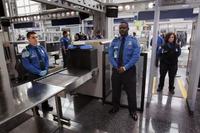-
Perspectives on terrorism and responses to it
The Strategic Multi-Layer Assessment office within the Office of the Secretary of Defense has published a new white paper, in Looking Back, Looking Forward: Perspectives on Terrorism and Responses to It Strategic Multi-layer Assessment, which offers discussions of different perspectives of terrorism and approaches to understanding the phenomenon. The papers cover topics ranging from strategic and adaptive considerations of terrorism to analytical considerations.
-
-
Death of Muslims used by extremists for recruitment, propaganda
In the last thirty years, conflicts in Afghanistan, Iraq, Bosnia, Chechnya, Somalia, and other countries have caused the death of four million Muslims. The theme of innocent Muslims dying as result of conflicts initiated by Western powers and their allies is a central motif used by Islamic militants to recruit new members. It is a theme which fuels anti-American sentiments in the Middle East and North Africa. Historians and Islamic scholars note that the notion that the West is orchestrating a “genocide” of Muslim is patently false, and that beginning with the Iran-Iraq War (1980-88) and continuing to the present day, more and more casualties are inflicted by Muslims against Muslims. Still, the myth of a non-Muslim genocidal “crusade” against Muslims is powerful, and is one which is effectively used by al Qaeda and other Islamic terrorist groups.
-
-
Psychologists: psychology research should promote peace and nonviolence
Political psychologists argue that psychology’s contributions can extend beyond understanding the origins and nature of violence to promoting nonviolence and peace. In a paper, they say they oppose the view that war is inevitable and argue that understanding the psychological roots of conflict can increase the likelihood of avoiding violence as a way to resolve conflicts with others.
-
-
Societies with rigid cultural values produce more terrorists

Examining more than 80,000 terrorist attacks which occurred between 1970 and 2007, researchers find that cultural values and norms which promote rigid thinking are related to a greater number of terrorist attacks or fatalities. Societies that have the belief that one’s destiny and life events are predetermined (fatalism), have very strong norms and severe punishments for deviation from norms (cultural tightness), and those that privilege masculinity and have very distinct gender roles (low gender egalitarianism) have higher terrorism rates than those that are low on these dimensions.
-
-
Violent hate crimes, lone-wolf terrorism share characteristics
Researchers examined the timing, locations, methods, targets, and geographic distributions of lone-actor terrorist attacks, group-based terrorist attacks, and violent hate crimes that occurred in the United States between 1992 and 2010. They found that locations where the 101 lone-actor terrorism incidents occurred shared more demographic similarities with the locations of the 46,000 violent hate crimes than with the locations of 424 group-based terrorist attacks over the time period.
-
-
DHS finds no racial profiling at Logan Airport

An August 2012 allegation of racial profiling by Transportation Security Administration (TSA) officers sparked an investigation into the screening practices of TSA officers at Logan International Airport. DHS has recently concluded an investigation into allegations, and concluded that there was no evidence that TSA officers in Boston have been targeting minorities for additional screening to meet quotas.
-
-
The arithmetic of gun control and gun violence
The most comprehensive statistical study of gun violence in the United States – examining data going back to the First World War – finds that, in more common domestic and one-on-one crimes, reduced legal gun availability, if properly enforced, is likelier to lower deaths. In rare mass shootings, armed citizens might save lives if sufficiently trained to avoid accidentally shooting fleeing bystanders. The authors note, though, that key parts of their equations should be studied more closely: the fraction of offenders who illegally possess a gun, the statistical degree of protection provided by legal gun ownership, and the number of people who are legally carrying a gun when attacked. Comprehensive data in those areas, they say, could further aid the development and implementation of effective policies.
-
-
Research priorities for understanding public health aspects of gun-related violence
A new report from the Institute of Medicine (IOM) and National Research Council (NRC) proposes priorities for a research agenda to improve understanding of the public health aspects of gun-related violence. The committee which wrote the report said significant progress can be achieved in three to five years through a research program that addresses five high-priority areas: the characteristics of gun violence, risk and protective factors, prevention and other interventions, gun safety technology, and the influence of video games and other media.
-
-
Overconfident, introverted people more likely to be e-mail phishing victims
New study shows that people who are overconfident, introverted, or women are less able accurately to distinguish between legitimate and phishing e-mails. Phishing is the use of fraudulent e-mail correspondence to obtain passwords and credit card information, or to send viruses.
-
-
The differences between impulsive and predatory murderers
A pioneering study finds distinct differences between two types of murderers: impulsive murderers and predatory, or premeditated, murderers. Impulsive murderers were much more mentally impaired, particularly cognitively impaired, while predatory or premeditated murderers exhibit deeper psychiatric disorders.
-
-
Steering clear of tipping points – and economic collapses
A new study shows how specific parameters can help us steer clear of tipping points in dynamic systems, such as entire economies. By managing macro-economic parameters, scientists believe it is possible to steer an economy around irreversible changes in its complex dynamics and avert potential economic disasters.
-
-
The contribution of social bonds to resilience in the Wake of Superstorm Sandy

A survey reveals new information about the importance of social and community bonds in recovery from a disaster like Superstorm Sandy. The survey data illustrate how important the help of friends, family, and neighbors can be in getting people back on their feet after natural disasters. These crucial social bonds are often overlooked as policy discussions tend to focus on the role that official institutions have in fostering resilience.
-
-
TSA’s behavior detection program not cost effective: DHS IG

DHS Inspector General (IG) has released a 41-page report last week stating that the Transportation Security Administration (TSA) cannot ensure that its behavior detection program, known as the Screening of Passengers by Observation Techniques (SPOT) is objective or cost-effective.
-
-
Fighting effectively without committing war crimes
Combat troops must minimize the humanness of their enemies in order to kill them. They cannot be effective fighters if they are distracted by feelings of empathy for opponents. Indifference to the enemy, rather than loathing, however, may help prevent war crimes and provide troops with a better path back to healthy civilian lives, researchers say.
-
-
Canada’s crime-rate calculation method significantly underestimates actual crime numbers
The government of Canada is using a method called “capping” to measure crime in Canada. Capping is a common methodological practice used in most victimization surveys. Researchers find, however, that the technique significantly underestimates the number of crimes — especially the violent kinds — that occur in Canada.
-
- All
- Regional
- Water
- Biometrics
- Borders/Immig
- Business
- Cybersecurity
- Detection
- Disasters
- Government
- Infrastructure
- International
- Public health
- Public Safety
- Communication interoperabillity
- Emergency services
- Emergency medical services
- Fire
- First response
- IEDs
- Law Enforcement
- Law Enforcement Technology
- Military technology
- Nonlethal weapons
- Nuclear weapons
- Personal protection equipment
- Police
- Notification /alert systems
- Situational awareness
- Weapons systems
- Sci-Tech
- Sector Reports
- Surveillance
- Transportation
Advertising & Marketing: advertise@newswirepubs.com
Editorial: editor@newswirepubs.com
General: info@newswirepubs.com
2010-2011 © News Wire Publications, LLC News Wire Publications, LLC
220 Old Country Road | Suite 200 | Mineola | New York | 11501
Permissions and Policies
Editorial: editor@newswirepubs.com
General: info@newswirepubs.com
2010-2011 © News Wire Publications, LLC News Wire Publications, LLC
220 Old Country Road | Suite 200 | Mineola | New York | 11501
Permissions and Policies
